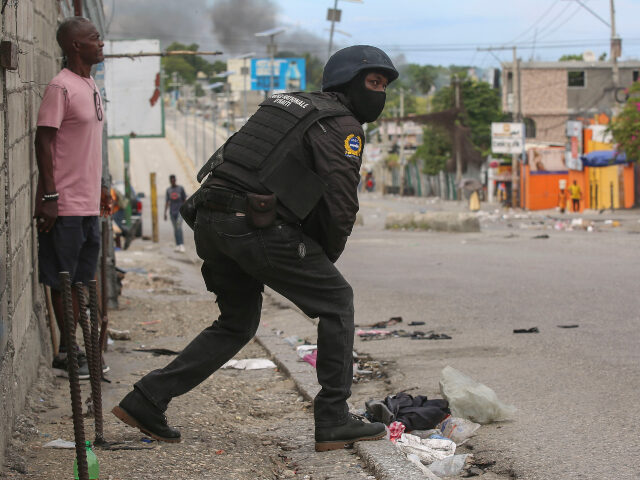Hundreds of Haitians packed their belongings and fled from previously secure districts of Port-au-Prince on Thursday as a running battle broke out between gangsters and police.
The gangs were apparently emboldened by the fall of interim Prime Minister Garry Conille, who was fired by the transitional government on Sunday, bringing a fresh wave of turmoil to the island nation.
The U.N. International Office for Migration (IOM) said over 4,300 residents of Port-au-Prince and surrounding towns have fled from their homes since Sunday, when gangs seized on the political chaos of Conille’s sacking to shut down Toussaint Louverture International Airport by shooting at planes and move into neighborhoods that have previously resisted gang takeovers.
The United Nations reported 20 gun battles in Port-au-Prince in just one day and updated its estimate of gang strength to warn that various gang coalitions now control 85 percent of the capital city.
Reporters saw crowds of panicked residents fleeing their Port-au-Prince neighborhoods, lugging suitcases and children. Entire neighborhoods emptied out in a matter of days. Some of the refugees said gangsters forced them out of their homes and then burned their domiciles to the ground. Plumes of smoke could be seen rising into the air in social media videos.
“The gangs are more powerful than the police,” one fleeing Haitian told the Associated Press (AP).
Haiti’s new interim prime minister, businessman Alix Didier Fils-Aime, released no statement about the violence, although he did promise to restore “security of the people, security of the goods and infrastructures, food security, and freedom of movement” when he was sworn in on Monday.
Gang bosses, on the other hand, are increasingly assertive in declaring themselves the new authorities in Haiti. Gang leader Joseph Wilson, known as “Lanmou Sanjou” among the Viv Ansanm criminal coalition he leads, told Haitians on Sunday that his soldiers would be “in the streets” enforcing their own brand of order.
“If you are reckless in the streets, you will pay the consequences, as of tomorrow,” he said on Sunday, just as the wave of gang violence was ramping up.
Medical charity Doctors Without Borders, known by its French acronym MSF, reported that several of its employees were accosted by the police on Monday and then tear-gassed by an angry mob because the police and vigilantes thought the patients they were transporting could be gang members. Several of the patients were dragged away and executed.
“The act is a shocking display of violence and it seriously calls into question MSF’s ability to continue delivering essential care to the Haitian people,” said Christophe Garnier, MSF’s head of mission for Haiti. MSF is one of the few non-governmental organizations (NGOs) still operating in Haiti.
Transitional council president Leslie Voltaire said on Wednesday the new wave of gang violence and territorial conquest,was clearly prompted by the sacking of Conille, but he predicted Fils-Aime would keep his promise to restore order.
“They thought there was a void, so they tried to fill the void, but once they see that there is a new prime minister, that there is a new sheriff in town, I think they will get less aggressive,” he said.
“I think the gangs are flexing their muscles to see how far they can push without the U.S. doing anything about it,” postulated Wolf Pamphile, founder of the Washington-based Haiti Policy House.
The U.S. State Department seemed to be running out of patience with the Haitian transitional government, complaining on Tuesday that the council was “unable to move forward in a constructive manner” with the ousted Conille and demanding an action plan from Fils-Aime to “prevent further gridlock.”
“The acute and immediate needs of the Haitian people mandate that the transitional government prioritize governance over the competing personal interests of political actors,” the State Department said.

COMMENTS
Please let us know if you're having issues with commenting.